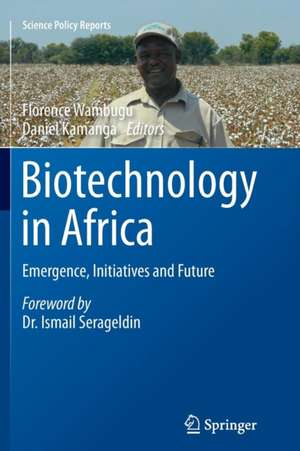Biotechnology in Africa: Emergence, Initiatives and Future: Science Policy Reports, cartea 7
Editat de Florence Wambugu, Daniel Kamangaen Limba Engleză Paperback – 23 aug 2016
| Toate formatele și edițiile | Preț | Express |
|---|---|---|
| Paperback (1) | 640.71 lei 6-8 săpt. | |
| Springer International Publishing – 23 aug 2016 | 640.71 lei 6-8 săpt. | |
| Hardback (1) | 645.79 lei 6-8 săpt. | |
| Springer International Publishing – 20 mai 2014 | 645.79 lei 6-8 săpt. |
Preț: 640.71 lei
Preț vechi: 753.77 lei
-15% Nou
Puncte Express: 961
Preț estimativ în valută:
122.60€ • 128.43$ • 101.61£
122.60€ • 128.43$ • 101.61£
Carte tipărită la comandă
Livrare economică 09-23 aprilie
Preluare comenzi: 021 569.72.76
Specificații
ISBN-13: 9783319374567
ISBN-10: 3319374567
Pagini: 302
Ilustrații: XI, 291 p. 49 illus. in color.
Dimensiuni: 155 x 235 x 16 mm
Greutate: 0.43 kg
Ediția:Softcover reprint of the original 1st ed. 2014
Editura: Springer International Publishing
Colecția Springer
Seria Science Policy Reports
Locul publicării:Cham, Switzerland
ISBN-10: 3319374567
Pagini: 302
Ilustrații: XI, 291 p. 49 illus. in color.
Dimensiuni: 155 x 235 x 16 mm
Greutate: 0.43 kg
Ediția:Softcover reprint of the original 1st ed. 2014
Editura: Springer International Publishing
Colecția Springer
Seria Science Policy Reports
Locul publicării:Cham, Switzerland
Cuprins
Introduction: The Importance of Political Will in furthering Agricultural Biotechnology for Economic Growth, Food and Nutritional Security in Africa.- Commercialized Genetically Modified Crops: Biotech (Bt) Cotton in Burkina Faso Demonstrates that Political Will is Key for Biotechnology to Benefit Commercial Agriculture in Africa.- Opportunities and Challenges of Commercializing Biotech Products in Egypt: Biotech (Bt) Maize: A Case Study.- Genetically Modified Crops Commercialized in South Africa.- Building the Bio-economy and Commercialization Challenges: Moving Africa Towards a Knowledge-Based Bio-Economy.- Biotechnology Success Stories by the Consultative Group on International Agriculture Research (CGIAR) System.- Towards Optimizing the Impact of Tissue Culture Banana in Kenya.- Technologies in Development: The Use of African Indigenous Genes in the Development of Transgenic Maize Tolerant to Drought and Resistant to Maize Streak Virus.-Biotechnology of Nutritionally Enhanced Food Crops Targeting Malnutrition in Rural Agricultural Populations: The Case Study of Africa Biofortified Sorghum.-Capacity Development: The Role of African Universities on Training and Mentorship of Biotechnology Scientists to Embark on Future Challenges in Africa.- Elements of an Enabling Biosafety and Regulatory Environment.- Harmonization of regional bio safety and regulatory services to remove future trade barriers in the (Common Market for Eastern and Southern Africa) COMESA region.- Communication and Community Engagement: Social Audits and their role in stakeholder-oriented innovation and fostering accountability and trust in agricultural biotechnology development programs.- Why communication and issues management must occupy a central role in GM projects: Case study of the Africa Biofortified Sorghum (ABS) Project.- Political Challenges: Does Africa need Political will to overcome impediments to GM crop biotechnology applications for agricultural economic growth and development as in the case of Brazil, Argentina and India.- Influencing politicians and policy makers to pave the way for a viable biotechnology sector: A case study of the Nigerian Biosafety Bill drafting, passage, experiences and lessons learnt at the Parliament.- The Way Forward.
Notă biografică
Dr. Florence Wambugu is the Founder, Director and Chief Executive Officer of Africa Harvest Biotech Foundation International (AHBFI) from 2002 to the present. She is a renowned plant pathologist who is dedicated to fighting hunger, poverty and malnutrition in Africa. She has made significant contributions in research, development and improved production in maize, pyrethrum, banana, sweet potato, sorghum and forestry in Kenya and Africa. She received her Bachelor of Science in botany from the University of Nairobi, her Master's in pathology from North Dakota State University and her PhD from the University of Bath. Her three-year post-doctoral work in the USA was funded by Monsanto. She is the recipient of the Kenya Agricultural Research Institute's (KARI) 1989 Crop Science Award for outstanding scientist of the year. She received the World Bank Global Development Network Award in 2000 for successful introduction of the tissue-culture banana in Kenya and also won the Woman of the Year Award by Eve Magazine that year. She is the author and publisher of Modifying Africa: How Biotechnology Can Benefit the Poor. Her transformational work in Africa has been featured in one of the highly viewed BBC documentaries called Jimmy Global Farm. Amongst her international speaking engagements, Dr. Wambugu was one of the key guest speakers during the 2009 Heads of Government of the Commonwealth meeting in Port of Spain, Trinidad and Tobago. Recently she was presented to Queen Elizabeth in recognition of her significant contribution in science, technology and society. She is recipient of numerous local and international honours, awards and grants with the most recent being the Yara Prize Award given by the Norway-based Yara Foundation in recognition of her advocacy of biotechnology to increase food production in Africa. Dr. Wambugu has served as a board member for international institutions, which include Private Sector Committee of CGIAR, United Nations Millennium Developmentgoals Hunger task force and currently, she is serving as a Council Member of the Japan Science and Technology in Society (STS) Forum, a member of the Global Agenda Council on food Security of the World Economic Forum (WEF), a member of the Science Board, Grand Challenges for Global Health (GCGH), and Bill and Melinda Gates Foundation and a Steering Committee Member of the European Action on Global Life Sciences (EAGLES).
Textul de pe ultima copertă
In this book, Florence Wambugu and Daniel Kamanga of Africa Harvest Biotech Foundation International bring together expert African authorities to critique various biotechnology initiatives and project future developments in the field in Africa. For the first time, African voices from multidisciplinary fields as diverse as economics, agriculture, biotechnology, law, politics, and academia, demand to be allowed to set the continent’s biotech development agenda. This book argues that there is a great future for biotechnology in Africa which sidesteps western interests that do not match those of the local populace. In these diverse chapters, Africa’s political and scientific leaders demand a greater say in how research and development funds are allocated and spent. They argue that Africa’s political leaders must see both clear benefits and have elbow-room to drive the change required. This is the way that African governments can employ workable policies, suitable biosafety legislation and regulation, and respond effectively to public-private partnerships. Wambugu and Kamanga show that biotechnology has the potential to improve food security and standard of living as well as mitigate the detrimental effects of climate change on the African continent.
Caracteristici
Biotechnology in Africa summarised by African experts Mix of science and policy critiques and recommendations Multidisciplinary incorporating elements of economics, agriculture, law and pharmacy Includes supplementary material: sn.pub/extras






























